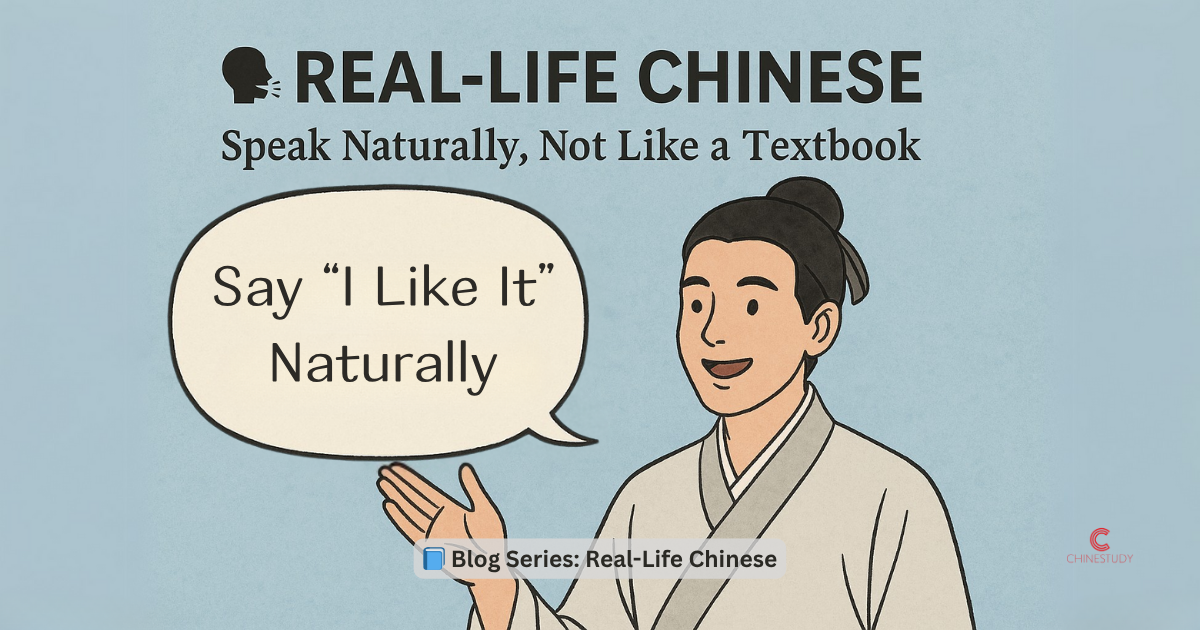How to Say “I Like It” Naturally in Chinese — Not Just “我喜欢”

Want to sound more natural when talking about things you like? Start here.
📕 Textbook Chinese
我喜欢… (Wǒ xǐhuan…)
“I like…”
It’s correct. It’s simple.
But in daily life, Chinese people don’t say this phrase so directly every time. It can sound a little too strong or stiff, depending on the situation.
✅ Real Chinese
Try these more natural, casual ways to say you like something:
- 蛮喜欢的 (mán xǐhuan de) – Kind of like it / Quite like it
- 挺喜欢的 (tǐng xǐhuan de) – Quite like it / Pretty fond of it
- 还蛮喜欢的 (hái mán xǐhuan de) – I kind of / quite like it
They feel softer, more natural — like how people actually chat.
💡When to Use Them
These phrases are perfect when:
✔️ Sharing casual opinions (movies, songs, apps, food)
✔️ Answering a friend who’s asking what you think
✔️ Making light conversation — not sounding too serious
They help you express your likes in a way that feels natural and friendly, not robotic.
🧱 Example Sentences
1.
A:你喜欢这部电影吗?
(Nǐ xǐhuan zhè bù diànyǐng ma?)
Do you like this movie?
👉 挺喜欢的。
(Tǐng xǐhuan de.)
Yeah, I quite like it.
2.
A:你常喝这个奶茶吗?
(Nǐ cháng hē zhè ge nǎichá ma?)
Do you drink this milk tea often?
👉对,我还蛮喜欢的~
(Duì, wǒ hái mán xǐhuan de~)
Yes, I kind of like it.
3.
A:你最近在听什么歌?
(Nǐ zuìjìn zài tīng shénme gē?)
What are you listening to these days?
👉 我蛮喜欢这首歌的。
(Wǒ mán xǐhuan zhè shǒu gē de.)
I quite like this song.
🤓 Why It Sounds Better
- Softer, more natural tone
- Sounds casual and friendly
- Matches how people talk in real life
- Helps you avoid sounding too strong or textbook-y
⚠️ Common Mistake
🚫 Using “我喜欢” too directly every time.
It’s not wrong — but it can sound too blunt, too formal, or too textbook.
✅ Instead, try:
- 蛮喜欢的 (mán xǐhuan de) – Kind of like it / Quite like it
- 挺喜欢的 (tǐng xǐhuan de) – Quite like it / Pretty fond of it
- 还蛮喜欢的 (hái mán xǐhuan de) – I kind of / quite like it
They sound smoother, softer, and much more natural.
🏆 Quick Practice
Q: Your friend says:
“你喜欢这个设计吗?”
(Nǐ xǐhuan zhè ge shèjì ma?)
Do you like this design?
Which reply sounds more casual and real?
A. 我喜欢。 (Wǒ xǐhuan.)
B. 挺喜欢的。 (Tǐng xǐhuan de.)
✅ Correct Answer: B
✨ Final Thoughts
Want to sound more casual when talking about things you like?
Skip the stiff “我喜欢.”
Next time, try these:
💬 蛮喜欢的 (mán xǐhuan de)
💬 挺喜欢的 (tǐng xǐhuan de)
💬 还蛮喜欢的 (hái mán xǐhuan de)
They’ll make your Chinese sound softer, smoother, and more natural.
📘 Want more like this? Check out the full blog series: Real-Life Chinese
Thank you for subscribing!
Have a great day!